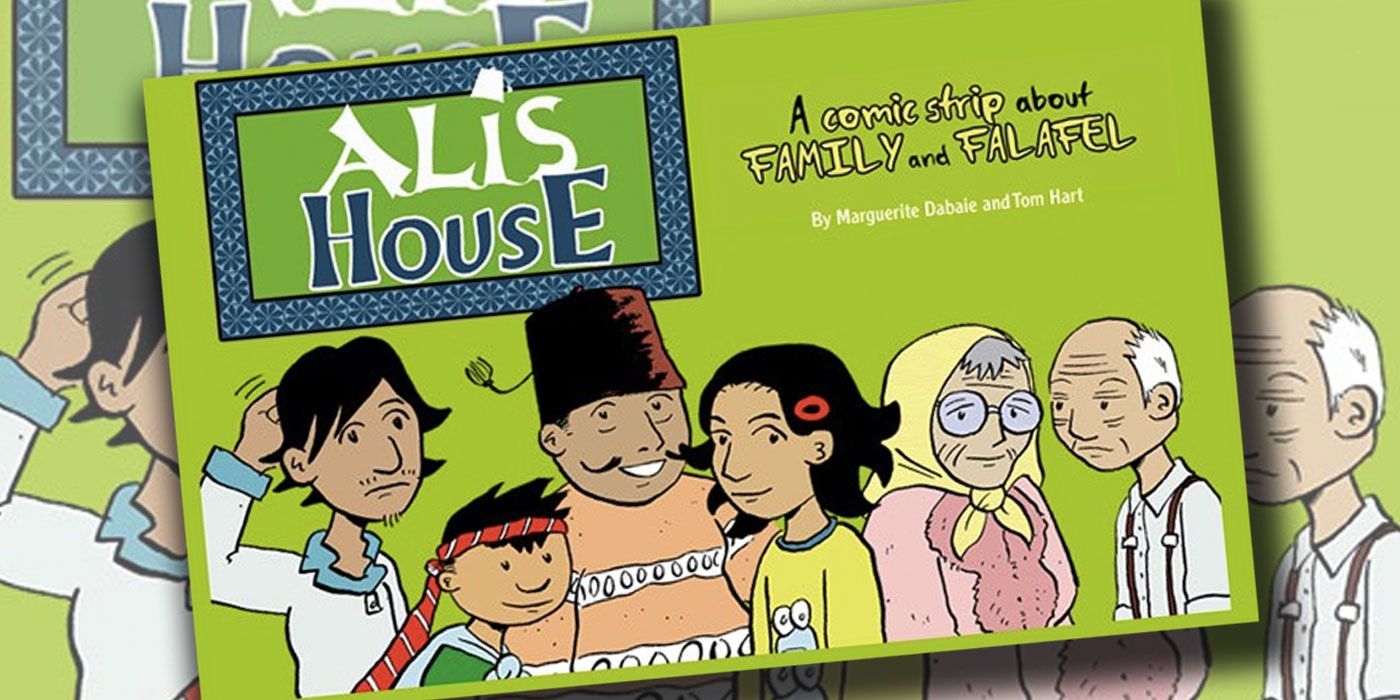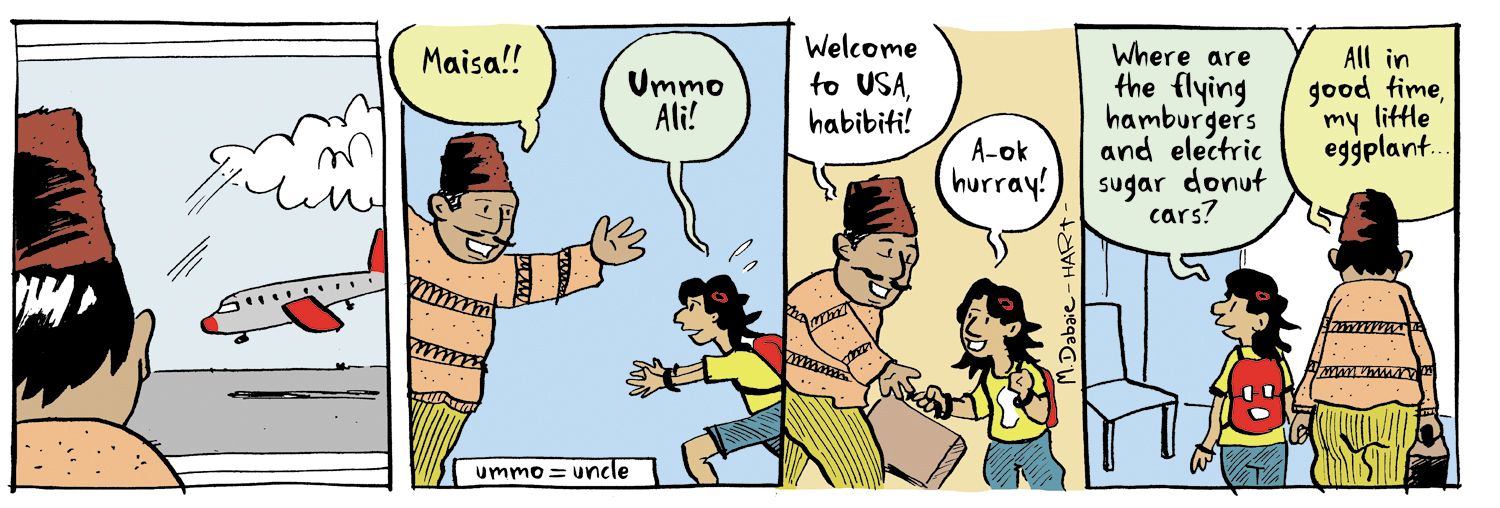Like many syndicated comic strips, "Ali's House" finds humor in the day-to-day life of a quirky family. What makes it unique is that the starring family is Arab-American: The central characters are Lebanese immigrants, and the comical misunderstandings begin when their 12-year-old cousin, Maisa, comes to the U.S. to join her family members who are already here.
Tom Hart and Marguerite Dabaie, the creative team behind "Ali's House," are both well known in indy comics circles. Hart is the creator of the gag comic "Hutch Owen" and the moving graphic memoir "Rosalie Lightning," while Dabaie is the author of two volumes of "The Hookah Girl," comics about growing up in a Palestinian Christian family in America, and "A Voyage to Panjikant," a graphic novel about life on the Silk Road.
Hart and Dabaie actually created "Ali's House" in the late 2000s and had signed a syndication deal with King Features, but, as they explain in our interview, that fell through for a number of reasons. The strip got a new life a few weeks ago when Universal Uclick picked it up for syndication on their GoComics website. While the strip is not running in any newspapers, the GoComics site gives it greater visibility, and Dabaie believes it is the only syndicated comic strip about an Arab American family in the English-speaking market.
What was the genesis of "Ali's House"?
Tom Hart: I had been trying for years to get my "Hutch Owen" syndicated. When I finally gave up, I had the idea to work with Margo to make a family-friendly Arab-American strip and try again for syndication.
Marguerite Dabaie: Tom was familiar with my "Hookah Girl" comic and approached me to work on the strip. He was interested in creating content with Arab-American characters in particular and wanted to use my own experiences as a springboard for the strip.
Did the idea come first or did your collaboration come first?
Hart: The idea! I think Margo thought I was crazy for a day or two, and then said "let's try it.”
Dabaie: Ha! My brain just had to do a little adjusting :)
This is actually the second time around for "Ali's House." Can you explain what happened?
Hart: The short version is that we sold the strip easily to King Features in late 2007 or 2008. We worked with editor Brendan Burford to develop the strip and create a backlog of nine months or so worth of material. Then, just before it was supposed to launch, the financial crash of 2008 happened, and the salespeople on staff who brought "Ali's House" to newspapers reported back that the newspapers thought we were crazy and that their businesses were collapsing and they even asked for a discount on "Blondie" and "Beetle Bailey" and "Hagar the Horrible."
So in essence the strip died then and there.
Dabaie: I think it’s also safe to say that the subject of the strip made for a more difficult sale--most newspaper editors are going to have a harder time seeing the need to include a strip about Arabs when they see their demographic as older and white, even though we made the strip to cater to those unfamiliar with Arab culture.
It was a bad combination of being “adventurous” in a dying market.
Can you briefly explain what "Ali's House" is about?
Hart: Maisa is a young Lebanese girl super-psyched to be coming to the USA to live with her Uncle Ali's family. Her cousins are very American, but her Uncle is still happily steeped in traditional culture, namely music and food. His parents are there and are very traditional, barely seem to notice the world around them. Thus, they're a little single-minded and crazy.
One thing that is kind of interesting is that there's no mom in this family—Ali is the head of the household. Why did you make that choice?
Hart: Margo and I talked about this and felt it worked, and that we might someday tell the backstory about Ali's wife—the cousin's mother. We presumed she had passed away some years ago but never wrote the specifics. There are many non-traditional families in the world, and we wanted to work with one. The presence of Teta, the grandmother, was very important to us.
The great thing about comic strips is you can add whatever you need later on. If we really felt the lack of a maternal presence, we could bring in a sister or other family member. We could even do flashbacks, etc.
Dabaie: I can’t remember the exact conversation we had where we decided on this, but it just clicked.
Ali is such a force in the strip and is a great parental figure. Looking at the strips now, I really like the idea that he’s a single parent who throws everything into it. He’s kind of forgetful and nuts and a little embarrassing, but he makes it work.
How did you come up with the idea for the talking olive tree?
Hart: There's a list of Charles Schulz' favorite ideas or "devices" in "Peanuts" that gave the strip a creative voice and enabled it to be original. On the list was "The Kite-Eating Tree" and "Lucy's Psychiatry Booth," etc. I wanted to create as many similar things like that.
Once I shared that with Margo, I forget how the Olive Tree came about.
Another one we never got to explore was a bunch of dolmas (stuffed grape leaves) who sit around talking to one another.
Dabaie: We have some completed talking grape leaf strips, actually!
I think it was as simple as discussing what devices would be important to a Lebanese family who wanted a “piece of home.” But also living in a place with a totally different climate and not totally owning up to that fact.
You incorporate a lot of bits and pieces of Lebanese culture—different words, foods, music—into the strip. Are these from your own homes?
Hart: From Margo's mostly. I live in an Arab-influenced household though. My wife is an Egyptian Style Dancer and I spent five months in Morocco, so I have an affinity for it. But they're mostly from Margo. She has great specifics we really want to explore.
Dabaie: Although I’m Palestinian, we thought that making the family also Palestinian would probably not go over too well with King—so we chose Lebanese origins for them, since they’re very close geographically and culturally.
Are you drawing on your own experiences or those of others for these storylines and gags?
Hart: We worked from Margo's experience, and then from imagination, though we also devoured a couple of books while creating these: A book on Arab folktales, and a memoir of growing up, Diana Abu-Jabar's "The Language of Baklava." The father in that book is quite the cook and bon-vivant, like Ali.
Dabaie: It was great being able to work with Tom particularly on this project because he’s very familiar with Arab culture but he’s also not all in it like I’ve been. That helps, especially since we wanted this strip to resonate to all sorts of people, not just people with even a passing familiarity with Arab culture. Sometimes I need to be told that not everyone knows what “habibi” means.
One thing you haven't mentioned yet in the strip is religion. Are you going to bring it up at all?
Hart: Margo was raised in a Christian household and I think if we ever brought the subject up, we would go that way, but we didn't intend to ever bring that up for a while.
Dabaie: I don’t feel it needs to be brought up or that it would fit the form of the strip. I never thought of them as a particular religion, but if people would like to assume they’re Muslim, that’s okay with me!
Your strip feels very timeless on the one hand and very timely on the other, with so much conversation going on in the public sphere about immigrants, particularly immigrants from the Middle East, in American society. Was this on your mind when you started the strip? How do you feel about it now?
Hart: I think we are both good-hearted people who are going absolutely crazy about the fear and anger to a multi-cultural society. We wanted to be a small force for good.
Dabaie: This strip is another iteration of "The Hookah Girl" in that I wanted to create it to show that Arab-Americans aren’t unusual as people, even if their situations are different.
Now that "Ali's House" has finally been syndicated, I’ve heard from some people that this might be an even more important time for a strip like this to be read than it was in 2008. I wouldn’t have thought so back then, but I do think that’s true. It’s not a good time right now for racial minorities in the US, and anything that can be done in any small way is worth doing, I think.
What sort of reception has the comic gotten so far?
Hart: The comments have been very good!
Dabaie: There were a few comments about Ali’s tarboosh/fez (he’s an old-fashioned dude with flair, what can I say? He also wears a very ugly sweater), but otherwise, it’s been positive!
What's next for "Ali's House"? Are you planning a collected edition?
Hart: We should. Margo?
Dabaie: Totally!




